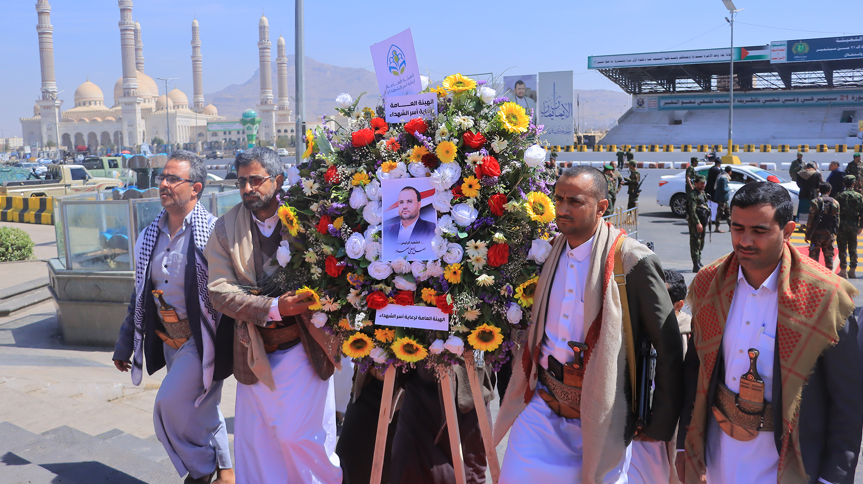The annual commemoration of Martyr’s Day for the year 1447 AH arrives as Yemen solidifies its political position after the culture of martyrdom transformed into a national project that forges deterrence, safeguards the dignity of the nation, and embodies its commitment to its just causes, foremost among them being “Palestine.”
The blood and sacrifices of the martyrs have nurtured a profound awareness and solid resolve in confronting the forces of arrogance and hegemony—”America and Israel”—and their proxies and agents in the region.
Martyrdom, in the Yemeni consciousness, has become a strategic vision that defines the direction of the national and political stance, outlines the boundaries of military, security, and economic action, and has become an integral part of the new state identity taking shape from the crucible of steadfastness and sacrifices.
Over the course of 11 years of confronting aggression, blockade, and difficult repercussions, the will of the Yemenis has crystallized into a new form of independent power that has made Yemen an active regional player and a political and moral center of gravity, expressing the conscience of the nation and leading the paths of struggle against the forces of arrogance and occupation.
The culture of martyrdom has succeeded in transforming blood into stages of construction and gains. Every martyr has served as a bridge towards deeper awareness, a more resolute generation, and a wider front, until sacrifice became a methodology upon which national decisions are built.
From this awareness, Yemen’s principled stance toward the Palestinian cause emerged—a stance measured by action and presence in the field. When the hand of aggression extended toward Gaza, Yemen initiated action from the Red Sea to Bab al-Mandab, declaring that the martyrs have become a continuous action in support of Palestine, and the martyrs’ blood has transformed into an energy that guides the nation.
What distinguishes the Yemeni experience today is its transition from the concept of limited resistance to the concept of active deterrence, where the conflict is managed from a position of initiative, and national capabilities are employed to protect sovereignty and vital interests, secure strategic waterways, and disrupt the calculations of hostile powers.
On the annual commemoration of the Martyr, Yemenis recall the images of self-sacrifice and their practical outcomes, manifested in the independence of Yemeni decision-making, a genuine capability to protect sovereignty, and a renewed fulfillment of the divine covenant that the martyrs carried in the nation’s conscience: a permanent presence in the face of tyranny, whatever the cost.
Yemen today holds an advanced position in the equation of resistance, combining will and capability, justice and strength, loyalty to the martyrs, and commitment to supporting the oppressed everywhere. The martyrs’ blood has forged a new trajectory for the nation toward liberation from hegemony and trusteeship, establishing a sovereign approach that expresses the will of the people to determine their own destiny.
With its faith-based awareness and revolutionary leadership, the Yemeni people have reached a high status in confronting projects of hegemony and arrogance, proving their ability to impose regional deterrence equations that protect the nation and change the balance of power. The Yemeni will, born from the depths of suffering, is today a protective shield for all free people against tyranny and a central axis in reshaping the Arab and Islamic landscape on the foundation of freedom, dignity, and sovereignty.
Over recent years, thanks to the sacrifices of the martyrs, the steadfastness of the people, and their free will, Yemen has achieved qualitative leaps in military industrialization. Defense production projects have become a banner of self-reliance and a symbol of national self-sufficiency, expressing Yemen’s capability to forge its deterrence through its own efforts, expertise, and efficiency. This achievement places the country in an advanced position among the nations in the region capable of building internal capacity and investing its energies to protect its assets and national security.
Among the fruits of the journey forged by the martyrs’ blood is the people’s cohesion around their leadership—a cohesion that has formed the solid support for the project of steadfastness and construction. This popular synergy represents the cornerstone that strengthens national resolve and grants political decision-making its power and independence. Through this unity, the profound relationship between the leadership and the people is embodied, based on faith in the divine project and the national vision that makes Yemen an impregnable fortress against all attempts at subjugation and hegemony.
In this context, analysts believe that Yemen has become the most complete model in combining faith-based thought with revolutionary action, and its experience in steadfastness has presented the Arab world with a new formula of moral power that balances martyrdom and sovereignty, and defense of the homeland with support for Palestine.
Martyr’s Day in Yemen has become a living testament that a nation possessing the consciousness of sacrifice holds the secret to survival and the strength for revival, and that the martyrs’ blood served as the starting point for the nation’s awareness, directing its compass toward liberation and sovereignty. It continues its path with steadfastness and faith from Sana’a to al-Quds, and from the Red Sea to the Mediterranean, on a route that shapes the features of a future forged by the people with their blood and their free will.

